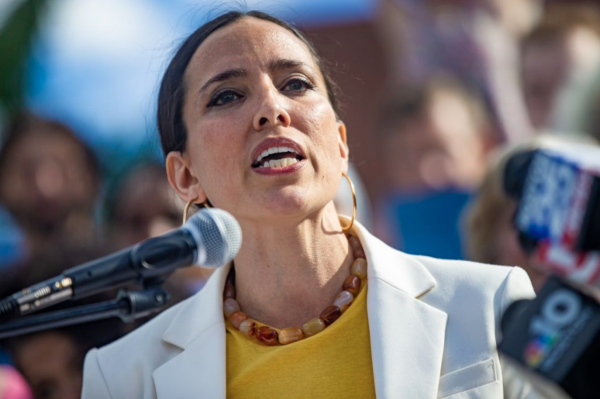December 21, 2022

Outgoing state Sen. Sonia Chang-Diaz, who is moving on from the State House after giving up her seat and campaigning for governor, plans to focus on spending time with her family before deciding on her next job. (Jesse Costa/WBUR)
When asked what’s next, outgoing state Sen. Sonia Chang-Diaz has a tongue-in-cheek answer ready: Eat all the leftovers from all the farewell get-togethers.
Her last day with an office under the golden dome of the State House is Jan. 3. Her successor, state Rep. Liz Miranda, takes the seat over after winning the race for the Second Suffolk Senate seat, which includes parts of Dorchester and Mattapan, as well as Jamaica Plain, Hyde Park, Mission Hill, and Roxbury.
A Democrat who lives in Jamaica Plain with her husband and two children, Chang-Diaz was first elected in 2008, when she toppled longtime incumbent Dianne Wilkerson in a bitter primary. Wilkerson was arrested on federal corruption charges weeks later.
The first Latina elected to the state Senate and a former public school teacher, she recalls entering the State House at an intense time. Corruption aside, the economy had plunged into what would become known as the Great Recession. “There was a lot of wear and tear on people’s faith in the institutions of government and Beacon Hill,” she told the Reporter in an interview. “That was part of my mission coming in, helping rebuild people’s faith in government.”
The public’s cynicism about Beacon Hill is still there, and it’s not entirely unearned, according to Chang-Diaz, who has clashed with colleagues over various bills and initiatives. But she recalls running into constituents who thanked her for responding to their notes, telling her, “‘It made me feel like someone in government cared about me.”
Her list of big-ticket accomplishments over 14 years runs the gamut: At the top is the Student Opportunity Act, passed into law in 2019, which seeks to send $1.5 billion into the state’s preK-12 schools. There also were reforms to the cannabis industry, the state’s Criminal Offender Record Information (CORI) system, and in policing through the creation of an independent agency to handle statewide certification for law enforcement.
“One of the hardest things in this job is the judgment calls about when you say yes to a compromise, and when you hold out for something stronger,” Chang-Diaz said, pointing to the Student Opportunity Act as a prime example in her eyes. “Fourteen years into this job, I can’t offer any sort of pat recipe of when you choose one.”
Talks between the House and Senate over the bill collapsed behind closed doors in 2018, with Chang-Diaz accusing House leaders of “rationalizations and double standards,” according to WBUR. Roughly a year later, the bill emerged and was signed into law by Gov. Baker. “The decision to hold out and say we’re going to come back stronger next year was an agonizing choice, but the right one,” she said, arguing that the final version was 500 percent bigger than what was on the table in 2018.
Whether the law will help school districts like Boston remains an open question. Chang-Diaz said she has a “healthy dose of humility” in what she can know about the future. “No one person in the policy making ecosystem can ensure things are going to happen,” she said. “This is going to sound corny, but it truly is a partnership between state and localities.”
There are no guarantees, she added. “You have to put conditions in place for success but real people in the real world have to implement it,” she said. Different districts are going to do different things with their money, and that’s by design, she said.
Looking ahead to the next few weeks, Chang-Diaz said she and her staffers have been working to give Miranda a “running start,” though “I think she’s got a great handle on the needs of her district.”
Does she have advice for her successor? Hire good people, Chang-Diaz said. “Those are decisions that are worth investing time and energy in,” adding that her office has seen an “incredible” pipeline in talent that includes Nika Elugardo, who ran in the Democratic primary against Miranda and came in second.
She stayed neutral in the race, she said, due to a “deep and meaningful relationship” with both Elugardo and Miranda.
Wilkerson came in third, ahead of a former federal housing official, Miniard Culpepper. Chang-Diaz said her relationship with Wilkerson is now “cordial,” and they run into each other at community events. Before the 2008 arrest for corruption and the ensuing stint in prison on bribery charges, Wilkerson did “pretty great things,” Chang-Diaz said. “No one can be encapsulated by one action or decision in their life and I’m a big believer in that.”
Her seat opened up due to her decision to run for governor, though she dropped out of the Democratic primary in June, clearing the way for Maura Healey, the attorney general who went on to win the November general election after trouncing a Republican challenger.
Returning to the question of what’s next, Chang-Diaz said she had no plans, nothing lined up, aside from spending more time with her family.
“I promise you I’m not trying to be coy,” she said when asked if she plans to run for public office again. “After an election is not a good time to make major life choices. You have to let time pass. I don’t think so, is my guess, but I truly don’t know and I’m trying not to make big decisions right away.”
Material from State House News Service was used in this report.



